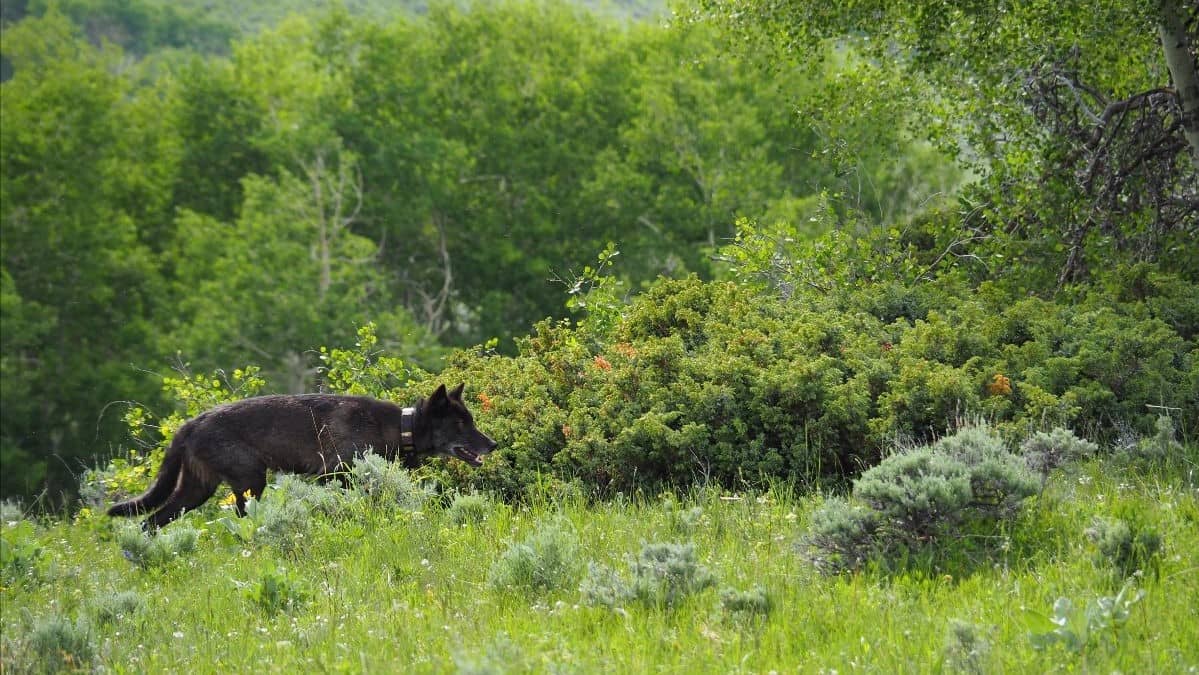
By Shannon Lukens.
Colorado Parks and Wildlife has provided Steamboat Radio and KRAI News with an update on the wolf pack in North Park. This is the pack that has caused the death of at least three head of cattle on the Gittleson Ranch, and the death of one ranch dog since December.
Travis Duncan with CPW is reporting they’ve seen seven animals in the pack of eight wolves, but they won’t confirm that one has died.
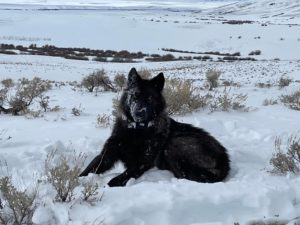
Three of those wolves were collared with GPS collars but those collars aren’t working anymore. There are no plans to collar any of the wolves in the pack right now, but that might happen in the winter. These wolves came into Colorado naturally. Duncan says if any wolves are actively reintroduced next year, they will be fitted with GPS collars at the time of their release. If you see a wolf, CPW has a wolf sighting form on their website that they would like you to fill out, and include pictures, if possible.
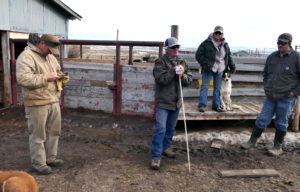
Duncan says CPW is continuing to work with ranchers in Jackson County so they can use approved hazing methods if they see naturally migrating wolves. A statewide Wolf Conflict Coordinator has also been hired to work with landowners to minimize wolf-livestock conflicts.
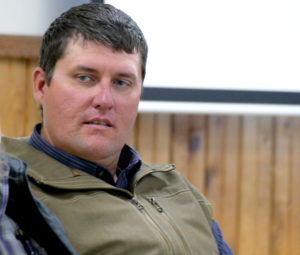
Regarding the one wolf that hasn’t been seen, Adam VanValkenburg, the president of the North Park Stockgrowers Association writes, “I’m confident the wolves haven’t been killed. They are just covering a wide area.”
Here is more from Travis Duncan, the Public Information Officer with Colorado Parks and Wildlife
There are eight wolves in the North Park pack. CPW has not confirmed any deaths in the pack. In mid-June, CPW had visual contact of seven animals in that pack, including the breeding male (#2101) and six black individuals. The breeding female (#1084) and all of last year’s offspring are black individuals. Last year’s pups are now close to full size and it is difficult, and sometimes impossible to differentiate these individuals from 1084 when observing from a plane and from far distances. The collar on 1084 is no longer functioning, so we cannot use that to determine if she is one of the black animals that has been observed. It is possible that she could be one of the members of the pack that was seen at that point in time.
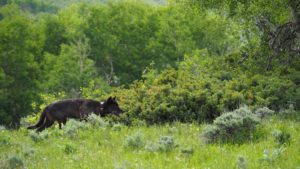
Update on collars in the North Park pack
Although three total collars have been on members of the wolf pack in North Park, all three collars are no longer functional.
One very high frequency (VHF) collar was deployed by a capture crew in Grand Teton National Park on wolf F1084 in Wyoming in 2017. The battery on the collar had a lifespan of five years and is no longer functional.
Two additional collars have been put on wolves in northern Colorado by CPW staff over the last two years. Wolf 2101 had a collar deployed in the spring of 2021 and wolf 2202 received a collar in the spring of 2022. Both collars had GPS (satellite) as well as VHF (radio) technology. Disappointingly, both the GPS and VHF functions on both wolf collars have failed.
The GPS technology collected location points at a predetermined interval, stored them, and then communicated the data via satellite to CPW biologists. (CPW did not know exactly where a wolf was in real-time. Staff could view the newly collected location data every few days.) VHF technology emits detectable radio frequencies and allows animals to be located in the field.
Although unfortunate, what happened with these collars is not all that uncommon.
There are no immediate plans to collar additional animals at this point in time. Using helicopters to capture animals in the heat of the summer presents logistical challenges in addition to concerns about animal welfare. Because gray wolves have been relisted under the Endangered Species Act, CPW will need to coordinate with the U.S. Fish and Wildlife Service to conduct future capture operations.
CPW plans to deploy more collars in the future for research and monitoring. This will likely occur in the winter season when the use of helicopters to capture wolves is logistically practical. All of the animals that are used in the active reintroduction will be fitted with GPS collars at the time of their release.
As the population grows and expands, not every wolf will have a collar. CPW does not plan to collar all wolves in Colorado, and collars will not provide real-time location information. This highlights the need to diversify wolf monitoring and research tools. This experience also demonstrates that it is important to develop conflict minimization strategies and programs that are not entirely reliant on having collar location information.
To confirm a wolf sighting, field biologists rely on observations like signs of tracks and scat. CPW also has a wolf sighting form available on our website and we encourage people to fill it out if they believe they have seen a wolf in their area. We ask that any photos or videos be included with these reports if available.
Additional information regarding the collars on the wolves in North Park is available on Colorado Outdoors Online here: https://coloradooutdoorsmag.com/2022/06/17/wolf-update-tracking-collars/
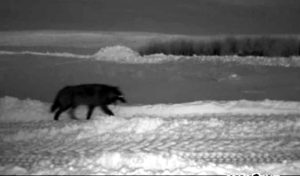
Additional information on how CPW is working with ranchers to reduce wolf depredations
It is important to note that no wolf reintroductions have taken place yet in Colorado and the verified depredation incidents occurring in North Park are not related to or a result of wolf reintroduction efforts in Colorado.
How is CPW working with ranchers to reduce wolf depredations?
CPW wildlife officers are working closely with ranchers in North Park to implement approved hazing methods for the naturally migrating wolves in Jackson County. Some methods include, but are not limited to: carcass management, guard animals, auditory and visual scare tactics (i.e., fladry, lights, sirens), and increased human presence/vigilance. Additionally:
New staff
CPW has hired a statewide wolf conflict coordinator damage specialist that will work closely with landowners to assist with minimizing wolf-livestock conflicts. This position will also provide outreach on conflict minimization techniques to local communities that are experiencing wolf-livestock conflicts.
A depredation resource guide specific to wolf depredation has been developed that is available online and soon in printed format to be distributed to ranchers in Colorado who are experiencing wolf depredations. The Wolf Resource Guide can be found on the CPW website: https://cpw.state.co.us/learn/Pages/Wolves-Stay-Informed.aspx.